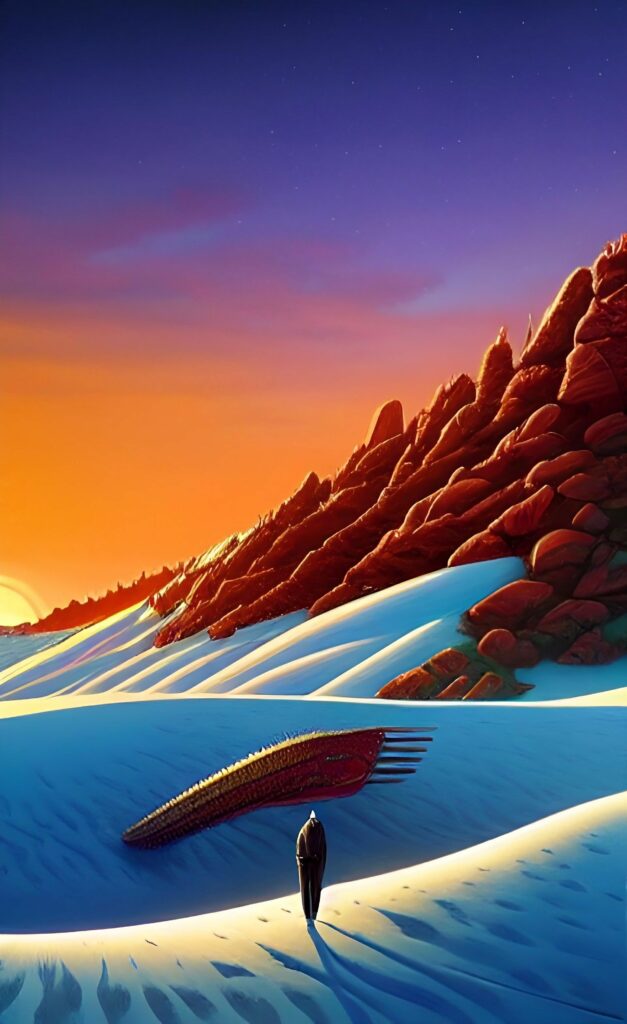
The sky is pale
at sunset.
The stone moon
haunts, mute,
above the hills.
I’m seeking,
without hesitation,
among white sands and shells,
cold tracks,
old tracks of cyclopes.
Silent thoughts
bury themselves
in my hair,
bare,
stripped
of dreams.

The sky is pale
at sunset.
The stone moon
haunts, mute,
above the hills.
I’m seeking,
without hesitation,
among white sands and shells,
cold tracks,
old tracks of cyclopes.
Silent thoughts
bury themselves
in my hair,
bare,
stripped
of dreams.
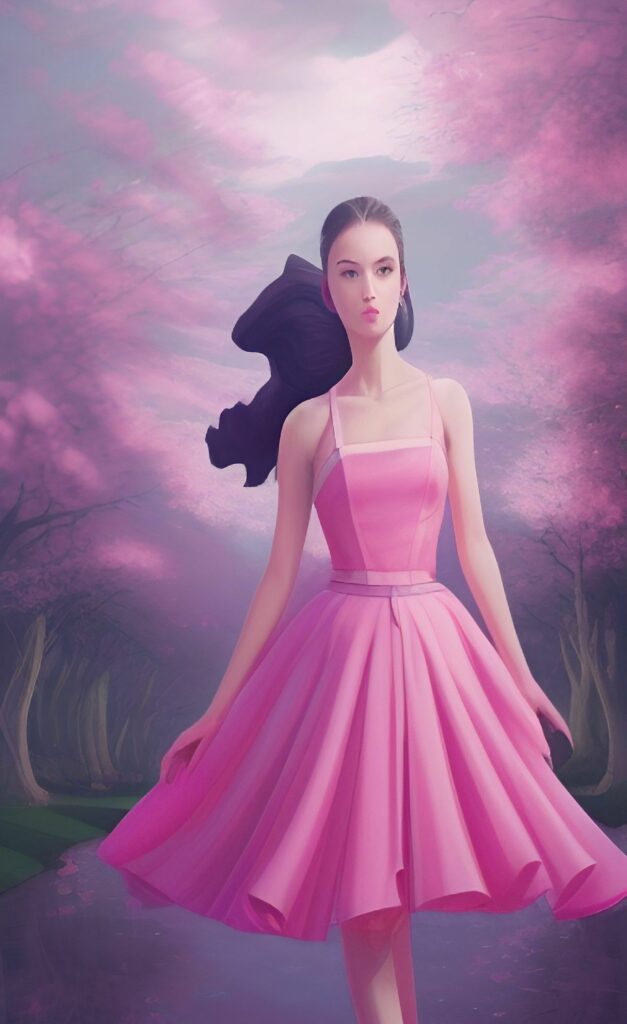
She was floating
in the twilight,
the sakura branches
spreading
over her dress,
filling the air
with pink.
After she left,
only the deafening silence
stayed,
like a bell,
behind the long kiss.
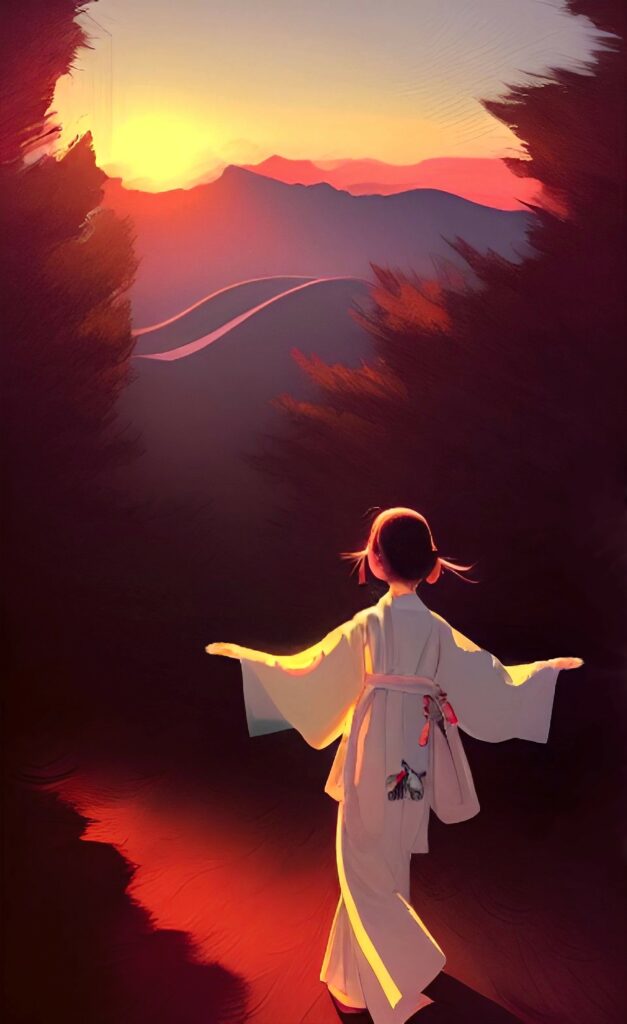
Perhaps
I’m leaning too much into the wind,
as if it were a carpet
meant to carry me over meadows.
Perhaps you’re right,
and it’s only my imagination
that flickered that day at Ryōan-ji**,
so long ago,
when I thought a spirit from the garden
joined me on the journey
to the other side of the Pacific,
next to the Rockies.
And when I thought you left,
perhaps you only went to sleep
while I returned to my ancestral home
from the Carpathian Mountains.
But now I’m all alone,
and yesterday
your name echoed
on the tv screen.
And then came the power cut
and the internet outage,
and next morning came the frog
jumping on the floor of the stable
and disappearing below through a crack,
and the stirring shadow
at the edge of the terrace,
and the cows that gave
more milk than usual,
and the rusty nails in musical dance
pushed by the broom,
and the candies
that shifted
on the plate
from the living room.
Perhaps
I’m leaning too much into the wind,
and it’s only my imagination
fluttering
like a pair of butterfly wings
burdened by hope.
But I can’t help thinking
that you might be here.
*Zashiki-warashi (座敷童子, or 座敷童, “parlor child”), sometimes also called zashiki bokko (座敷ぼっこ, “parlor boyo”), are spirit-like beings told about mostly in the Iwate Prefecture. They are said to be yokai that live in parlors or storage rooms, and that perform pranks, and that people who see one would be visited with good fortune. (from Wikipedia)
**Ryōan-ji (Shinjitai: 竜安寺, Kyūjitai: 龍安寺, The Temple of the Dragon at Peace) is a Zen temple located in northwest Kyoto, Japan. It belongs to the Myōshin-ji school of the Rinzai branch of Zen Buddhism. The Ryōan-ji garden is considered one of the finest surviving examples of kare-sansui (“dry landscape”), a refined type of Japanese Zen temple garden design generally featuring distinctive larger rock formations arranged amidst a sweep of smooth pebbles (small, carefully selected polished river rocks) raked into linear patterns that facilitate meditation. The temple and its gardens are listed as one of the Historic Monuments of Ancient Kyoto, and as a UNESCO World Heritage Site. (from Wikipedia)
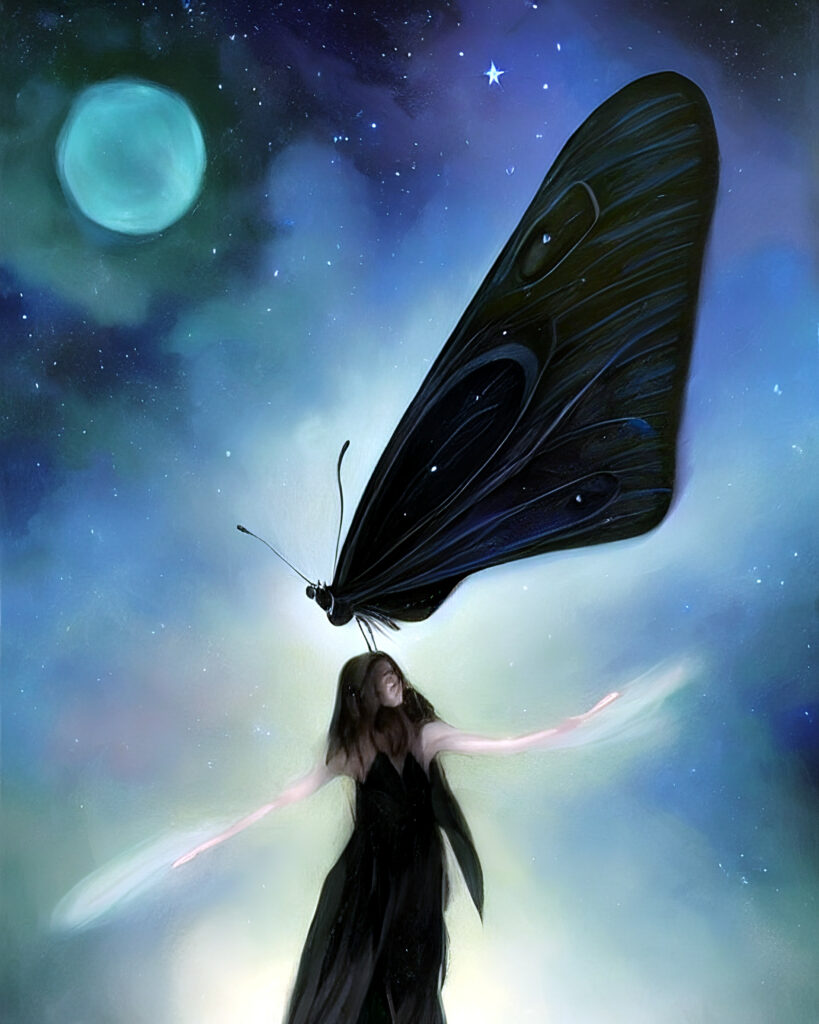
It came
surrounded by night.
My mother was asleep,
smiling serene
inside a lacquered box.
And it was quiet,
so quiet that
I wanted
to scream
forever.
The house was already
full of people.
We were stepping in circles,
boiling planets around a silent star,
candles and prayers
blending in a solemn symphony.
The butterfly stopped
on the northern wall,
directly under my room’s window,
black wings pierced by nails,
like the hands of a martyr
touching a cross.
The others left
before midnight.
Trying to take refuge in dreams,
my eyes,
wide shut by tears,
sank in beams of blue light
pouring out of the box
where mother was resting.
Don’t be afraid,
the butterfly said.
I’m your grief,
and I will help you get over this.
Of course, it will take time,
but I will be here,
my friend!
I will rise
and shine for you
until the end!
Was it yesterday?
Was it a lifetime ago?
Sometimes,
when I lift my eyes,
it spreads soft wings
like a smile,
absorbing the light,
swallowing my inner darkness,
the black butterfly,
my new friend
of sorrow and pain.
text & artwork by Marian C. Ghilea
#poem #nature #butterfly #art #sorrow #death #pain #grief #black #funeral #mother #fantasyart #scifiart
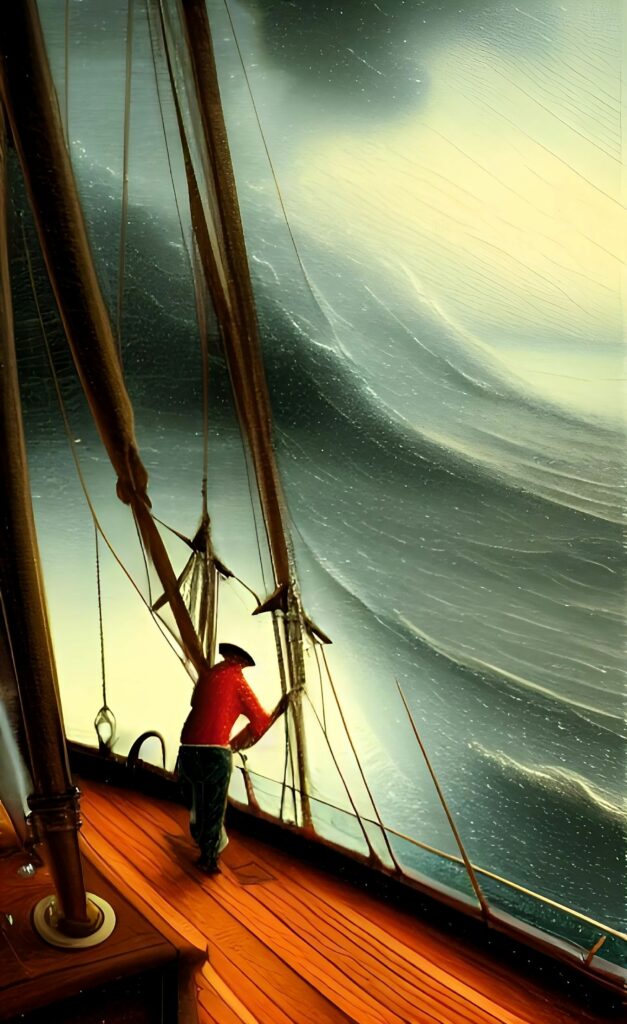
A path is made by those walking on it.
Chuang Tzu (c. 369 — c. 286 BC)
Part 1:
Triangulum with Three Flashes of Lightning
The thoughts of Alberto Shimada, the second lieutenant of Excelsior
“If you could be someone else, who would you like to become?”
“I think I’d like to change back into myself. As of late, I often sense that my life is confined to the shadow of someone else’s dreams.”
“Yet, being yourself can often be a challenge. I don’t even understand well what this means. Can you define the idea of self? Can you explain what the self is?”
“You have just asked me about imagining being someone else, and now you’re saying you don’t fathom the idea of self? Why has everything to be so confusing? I, the person here, thinking and talking, the one who is within this body should be me, the ego, the self.”
“Then, if the one within your body, seeing, hearing, talking, thinking is you, how can you say you’re under the impression of being someone else?”
“I might have been myself in the past, but at night, soon after I go to bed and fall asleep, I dream of other worlds and people. And sometimes, more often than I wish, I dream of being a different person. Then, when I wake up from my dream the next morning, how can I trust I’m still the one who went to sleep? Furthermore, if I’ve got lost along the way and someone else is here in my stead, where am I now?”
“How can you know you’re not the same person? Anyone who has a mind and a heart, sees and hears, feels and talks within your body has to be you. It doesn’t matter whether you believe or not that you have a certain name and age and status. When you dream you are someone else, it is still you who sleeps and lives the other life in the realms of Morpheus. On those lands of phantasy, you can be more than a mere human. You can expand. Why should you limit your perception and existence to the willow shell that is your body?”
“Yet, is it really me the one who wakes up in the morning? How can I know? How can I be sure the life from my dream is not the real life? Maybe I’m dreaming now, and everything around me is only an illusion. Yet, I still feel that between dream and reality, between the one who dreams and the one who is dreamed of, there has to be a subtle difference. Nonetheless, dream and reality look now like two mirrors reflecting each other. Or, even better said: like a single mirror reflecting itself. How can I tell which one is the mirror and which one is the reflection?”
“You wish to find out which one is your true self? Then, in silence, you have to shut down the doors and windows connecting your mind and soul to the outside world. Light, sound, heat, or cold should not bother you. Then you can listen to what your heart is saying. When you can hear your heart, you are the mirror; when you can’t, you are the reflection. Yet, don’t forget: sometimes the mirrors can break! When this happens, you will see how the ego itself is an illusion, an illusion within an illusion. And when you reach this level of understanding, you can become anyone you like.”
Seraphios — Dialogues at the Edge of Time
A wet wind is blowing onto my face, cool and refreshing. From the rhythmic splashing sounds of the foamy waves, echoes are sprouting, ethereal and impermanent. Their music is pouring inside my ears like a delicate whisper.
My lungs are slowly moving up and down like a pair of wings, breathing in and out the glorious dance of the atoms that make up the air of my world. At this moment, the whole Universe is breathing in and out with me. In and out, inside and outside. From the slow beats of my heart to the Moon, the Sun, and beyond, there is no real distance anymore.
Soon, the flow of time reveals itself to be as illusory as the manifestation of space. This inner mounting flame is pushing open my eyelids. The light from outside pours in, filling my soul with eternity. Each breath feels now like a new birth of myself, like a cyclic return into existence. Everything is one, and one is everything.
Too many ideas and concepts are already roaming wild through my mind. Too many thoughts are flooding my perception. Some are familiar, but other seem to come from far away, as if they belonged to total strangers, mirroring me and mirroring themselves. Something doesn’t seem quite right. Have I been somewhere else before? Or, perhaps, have I been someone else before?
In the beginning was the light. Can we go back to the beginning? Can we return to what we used to be and become as pure as the light again?
♣
The sound of water.
Mother Nature has put on golden colors everywhere in and around the city. But the metropolis, as well as the continent, were left behind two days ago. Now only the ocean, an endless expanse of blue-green liquid with a faint salty odor, is stretching all the way to the horizon, wherever I look.
Standing on the deck of our fast brig, I can sense it’s autumn even here. Something hard to define makes me think of falling leaves. Is it the scent of the sea? Or could it be the fragrance of the wind? I turn my eyes up. A flock of fluffy clouds is towering high above the ship’s masts as if they were watching us. From the east, a pale, almost sick-looking Sun is shooting shy arrows of light.
The breeze blowing from the stern is pushing us with constant speed towards our destination. The tall prow cuts the waves with a slow rocking motion that generates a tender hissing sound. Here I am, on this beautiful morning of October 13, 1794. I’m in charge of the weather observations and the duty shifts of the crew.
Our vessel is sailing towards the Southern Islands, transporting weapons and ammunition. In addition, we’ve got a squadron of thirty soldiers as passengers. The soldiers will replace the current garrison in charge of the fort built there more than a century ago. These three tiny islands from the Tropics are locations of significant strategic importance for our navy. They oversee the main routes of an increasing number of ships that travel from our country towards exotic and commercially profitable shores from the Southern Hemisphere. My second mission in such far-away waters has just begun. A journey from autumn to summer and back.
The hours pass quietly. While I fill my logbook with notes, the wind is pushing our vessel with a speed of seven knots. If the weather stays the same, I should expect Excelsior to reach her destination in about eight days. But will it stay the same?
When I check the horizon with my handheld telescope in the early afternoon, I notice dark clouds gathering far away to the southeast. They’re spread over a large area and are set to cross our path. Changing the course to avoid bad weather could mean arriving at least one day late. We are most likely going to run into a storm during the first hours of the evening.
The captain is in his cabin, looking at the maps. I inform him immediately about the oncoming storm. We both return to the deck and begin the preparations for the soon-to-be unpleasant encounter. The captain wants to minimize any delay caused by the elements. He plans to take advantage of the cyclone, using it to shorten the journey to the Southern Islands by about one day. He also wants to test the efficiency of the crew. We have many new hands on board, and this storm is an excellent opportunity to check their skills.
The ship changes course to south-south-west. With no lee shore anywhere near our route, we plan to partially skirt the storm, using the strong winds that blow towards the south on the west side of the cyclone. Excelsior will keep sailing at full speed, gradually reefing her sails as the wind gets stronger. Hence, many sails will stay up and running almost until the storm is ready to strike. Our crew is large enough to take care of them in time.
Late in the afternoon, dark-gray clouds begin to fill the sky. The ocean becomes agitated and foamy. Legions of malefic spirits seem to be dancing on top of the ominous white waves. They are doing the final preparations to ram hard into our ship’s hull and do as much damage as they can. Some sails are still up, although many are reefed now. They’re pulling Excelsior southward with a speed of about eleven knots. The daylight is fading. The celestial tanks hanging above us are ready to explode and flood our vessel with a torrent of rain.
text & artwork by Marian C. Ghilea
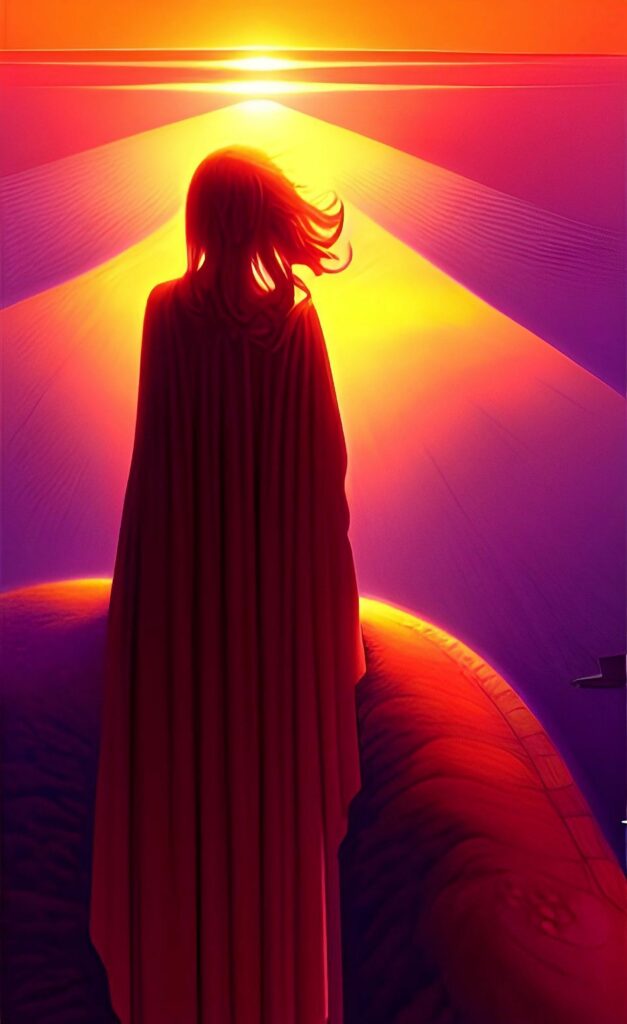
Words –
printed,
or filling a screen.
They
are only
bells
swaying
hesitantly
in long calls
that shake
the clouds.
Better
lift your gaze
away from this text
and let your wings
spread high
until they touch the sky.
(c) Marian C. Ghilea, 2021-2022
artwork by Marian C. Ghilea
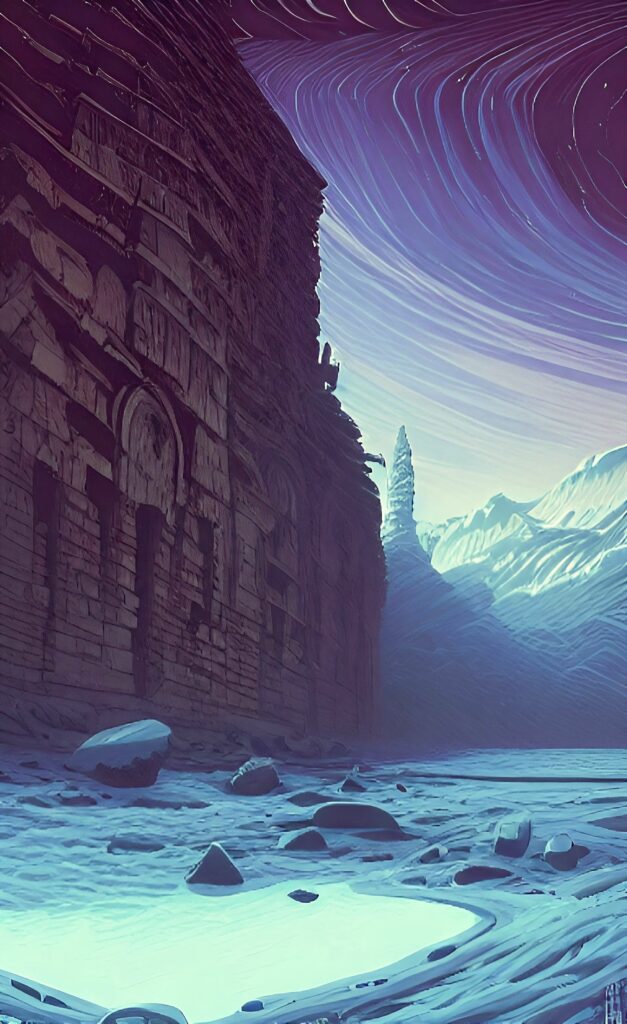
Two Bells
Time never drains.
Always restless,
it pours into entropy,
filling eons
with whispers.
The first bell tolls,
and everything
begins to take shape.
The second bell tolls,
and the Universe is already too old,
an ancient child gazing ahead
towards the incoming end,
cloudy ripples
of dreams
filling whispers
with eons.
Două clopote
Timpul nu se scurge niciodată.
Mereu neliniștit,
se varsă în entropie,
umplând eoni
cu șoapte.
Primul clopot sună,
și totul
începe să prindă contur.
Al doilea clopot sună,
și Universul e deja prea bătrân,
un copil străvechi ce privește înainte
spre sfârșitul care se apropie,
valuri înnorate
de vise
umplând șoapte
cu eoni.
Du sonoriloj
La tempo neniam malpleniĝas.
Ĉiam malkvieta,
ĝi enfluas en entropion,
plenigante eonojn
kun flustroj.
La unua sonorilo vokas,
kaj ĉio
komencas formiĝi.
La dua sonorilo vokas,
kaj la Universo jam estas tro malnova,
antikva infano rigardanta antaŭen
al alvenanta fino,
nubaj ondetoj
de revoj
plenigante flustrojn
kun eonoj.
Deux cloches
Le temps ne s’écoule jamais.
Toujours agité,
il se déverse dans l’entropie,
remplissant les éons
avec des chuchotements.
La première cloche sonne,
et tout
commence à prendre forme.
La deuxième cloche sonne,
et l’Univers est déjà trop vieux,
un enfant antique regardant devant lui
vers la fin qui approche,
des ondulations nuageuses
de rêves
remplissant les chuchotements
avec des éons.
Dos campanas
El tiempo nunca se agota.
Siempre inquieto,
se derrama en la entropía,
llenando eones
con susurros.
La primera campana toca,
y todo
comienza a tomar forma.
La segunda campana toca,
y el Universo ya es demasiado viejo,
un niño antiguo que mira al frente
hacia el final que llega,
ondas nubladas
de sueños
llenando susurros
con eones.
Due campane
Il tempo non si svuota mai.
Sempre inquieto,
si riversa nell’entropia,
riempiendo gli eoni
di sussurri.
La prima campana suona,
e tutto
comincia a prendere forma.
La seconda campana suona,
e l’universo è già troppo vecchio,
un antico bambino che guarda avanti
verso la fine in arrivo,
increspature nuvolose
di sogni
che riempiono sussurri
con eoni.
Dois campainhas
O tempo nunca esgota.
Sempre inquieto,
derrama em entropia,
eons de enchimento
com sussurros.
A primeira campainha tocou,
e tudo
começa a tomar forma.
A segunda campainha tocou,
e o Universo já é demasiado velho,
uma criança antiga a olhar para a frente
para o extremo de entrada,
ondulações nebulosas
de sonhos
sussurros de enchimento
com eons.
Zwei Glocken
Die Zeit läuft nie ab.
Immer rastlos,
ergießt sie sich in die Entropie,
füllt Äonen
mit Geflüster.
Die erste Glocke läutet,
und alles
beginnt Gestalt anzunehmen.
Die zweite Glocke läutet,
und das Universum ist schon zu alt,
ein uraltes Kind, das nach vorne blickt
auf das kommende Ende,
wolkige Kräuselungen
der Träume
füllen Flüstern
mit Äonen.
Два дзвони
Час ніколи не вичерпується.
Завжди неспокійний,
він перетворюється на ентропію,
наповнюючи віки
шепотом еонів.
Дзвенить перший дзвоник,
і все
починає набувати форми.
Пролунав другий дзвінок,
і всесвіт вже занадто старий,
древнє дитя, що дивиться вперед.
назустріч прийдешньому кінцю,
каламутні брижі
мрій
наповнюючи шепіт
еонами.
Два колокола
Время никогда не стекает.
Всегда беспокойно,
она выливается в энтропию,
эоны наполнения
с шепотом.
Первый колокол звонит,
и всё такое
начинает обретать форму.
Второй колокол звонит,
а Вселенная уже слишком стара,
древний ребёнок смотрящий вперёд
к входящему концу,
облачные колебания
мечты
шёпот при набивке
с эонами.
二つの鐘*
時間は決して減らない
いつも動いていて
エントロピーに流れ込む
何年もの時を
囁きで満たす
最初の鐘が鳴り
そして全てが
形になっていく
二回目の鐘が鳴ると
宇宙はすでに年をとりすぎている
古代の子供が前を見つめている
終わりに向かって
夢の雲の波紋が
囁きを埋める
何年にもわたって
© Marian C. Ghilea, 2021
artwork by Marian C. Ghilea, 2022
*Japanese translation by Akiko Ishida
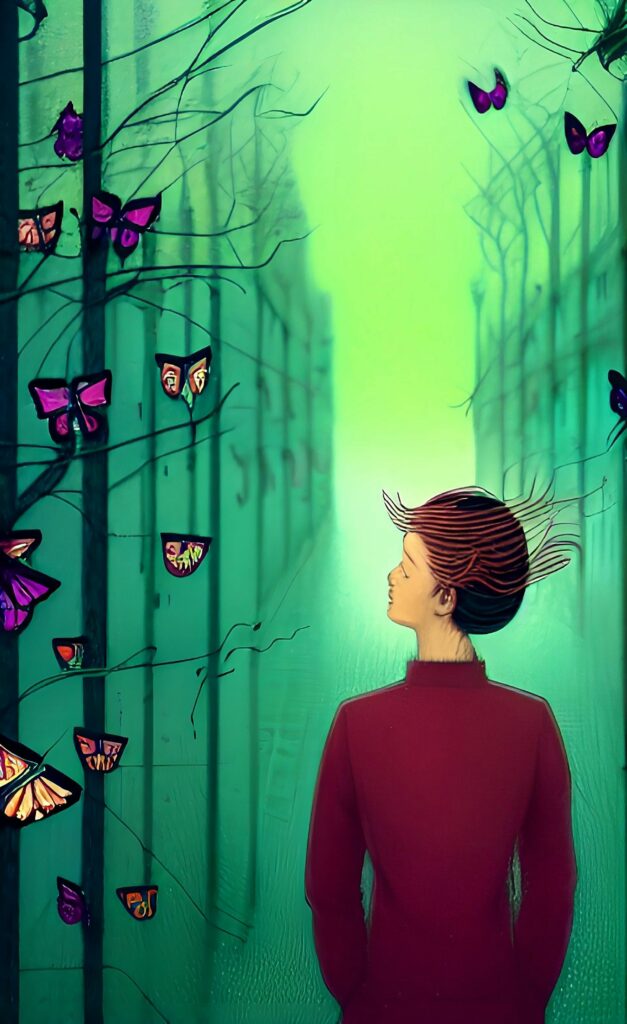
first rain of autumn –
I feel like a butterfly,
lost inside my dreams
(from the book “Tides of Amber“, 2019)
© Marian C. Ghilea, 2019
artwork by Marian C. Ghilea, 2022
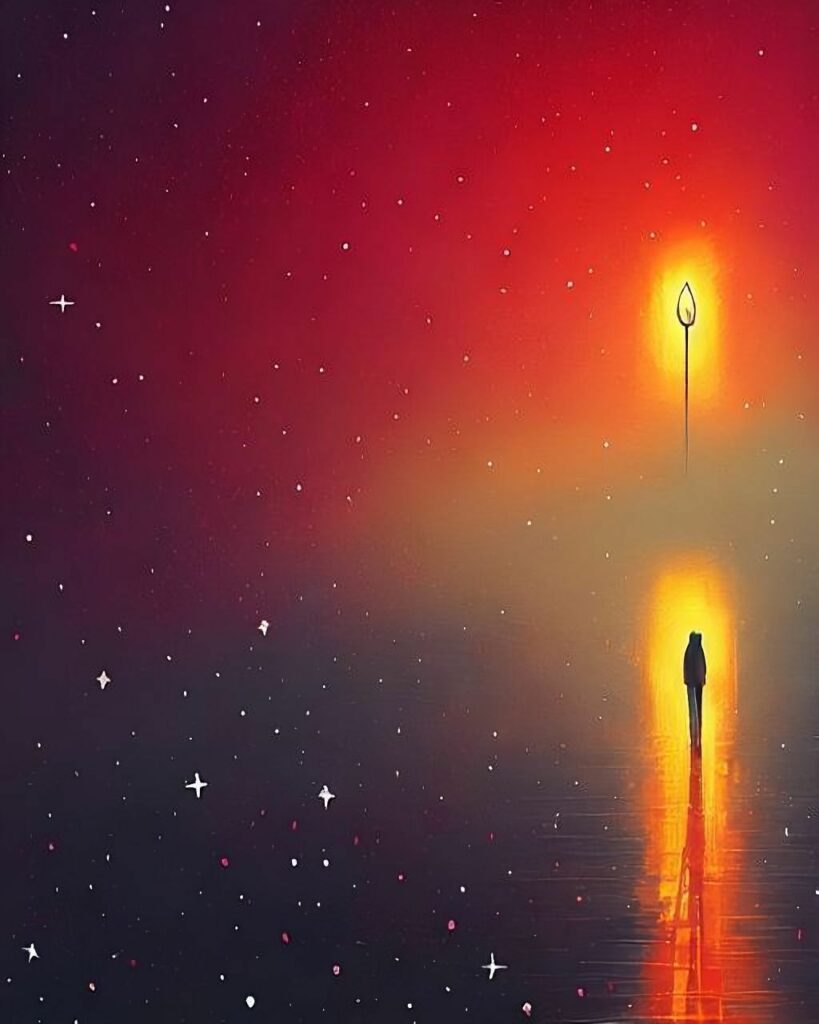
Dear Mother,
I know you would have wanted me to go on after you are no more. I will do my best to continue my journey on Earth with my head held high until it is my turn to rest. I will write to you often and hope you can find time to read my letters on your journey among the stars.

Dear citizen,
we dwell
on opposite shores
washed by
mismatched horizons.
What you want
from the future
is going to burn down
my world.
Yet,
I’m a citizen,
like you.
I dream of lions
and sometimes
spend long hours
counting stars.
Maybe
you could come
before nightfall.
You can stand by me
on this neutral ground.
We shall wait
together
for the stars
while our differences
fade away
into the twilight.
© Marian C. Ghilea, 2021
artwork by Marian C. Ghilea, 2022

Footsteps echoing,
turning around,
melting
under stars.
History,
memories,
heartbeats marking the seconds
flowing into the night.
Above, the same sky
hidden by street lights,
is guarding, unperturbed,
the city washed by
the deep, invisible
river of time.
poem & photo: Marian C. Ghilea
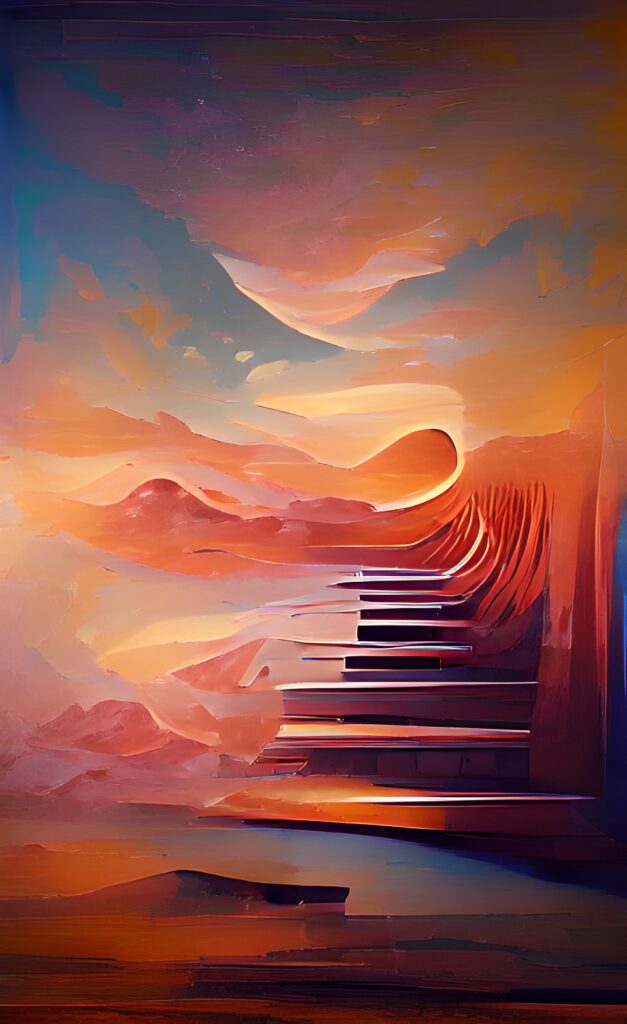
Prologue
I cannot prevent myself from wondering about the new generations that shall sprout into this world millennia from now. What shall they think of us? Shall they see our accomplishments as simple and primitive? Shall they portray us as uneducated barbarians? Shall our beliefs seem to them just unsophisticated superstitions? Yet, are these things going to matter in the end? And, ultimately, is there any end at all? What if the flow of time is only an illusion generated by our minds?
Elessyos of Miletus
We are tempted to see our existence as composed of a single reality. This reality flows from the immutable past to the fluid future through a present thinner than a knife-edge. The general view is that only inside this almost infinitely thin slice of time we live, act, and are being acted on. However, our lives are operating in a more complicated physical world.
The space-time around us can be better described as a network of possible realities. These realities are entangled and intertwined like the threads of many yarn balls thrown away in random directions from the singularity that gave birth to our Universe. In some locations of this complex multidimensional maze, the notions of past and future lose their meaning and are sometimes interchangeable. Meanwhile, the almost infinitely thin present can expand significantly. In other words, one can say that when we are not happy with the future, we can change the past.
Kai Ishida — a precursor of the New Physics
Nothingness said to Somethingness: “There is no universe right now, no space no time, nothing to separate the whole from its parts or to distinguish between inside and outside. Even you don’t exist, except in my imagination. So, let’s change this state of things and build a beginning from where to spin a new story.”
Somethingness replied: “As soon as this thought came to your mind, you became me, and now it’s you who doesn’t exist anymore. No problem, I shall do what you have asked for, what I had asked for.”
Hence, non-action became action, and non-being became being. From being, a beginning was born.
♣
In the beginning was the sound, and the sound was without form, and the sound was reigning supreme over the endless water. The sound became louder, generated vibrations, and expanded until it reached the water’s surface. Its touch changed the water, bringing into existence tiny ripples of resonance that spread in all directions. Soon, these ripples multiplied, grew, and evolved. Their shapes became stable. With them arrived new concepts, such as structure, complexity, and thought.
In the beginning, space was the only thing alive. Unbounded, undefined, unmeasurable. Space stretched, bent, and twisted until it closed onto itself. It rendered discontinuities that brought matter into existence as mass and energy, its two complementary sides. Then, from the random vibrations of the matter manifested as energy, the sound came into being.
In the beginning, there was no beginning because there was no time and space. From the singularity that did not exist and cannot be described, time and space appeared. Then, from time and space, everything else came forth. Everything is one, and one is everything.
In the beginning that did not exist, beyond anything the thought can conceive, beyond any beyond, in that beginning with no beginning, He was. Hence, everything started from Him and with Him. Yet He is only a name but not the real Him. The finger that points at the Moon is not the Moon. It’s just a finger.
And so, the flow of a story commences, entangled between pasts and futures, twisted by ripples of reality and illusion, washed by the incessantly changing waves of space and time. This flow starts shyly, more like a whisper, like a tiny mountain stream hidden under deep layers of ice and snow. However, it soon grows and expands, turning into a wide river. Before long, its deep waters pour, unstoppable, into the sea.
The sea itself is full of life and in continuous transformation. Its restless surface is periodically pulled towards the sky by the heat from the Sun, becoming clouds and returning, as rain, to the source. When this happens, the cycle is complete. The story folds over itself, returning to the origin.
In the beginning was the end…
text & artwork by Marian C. Ghilea
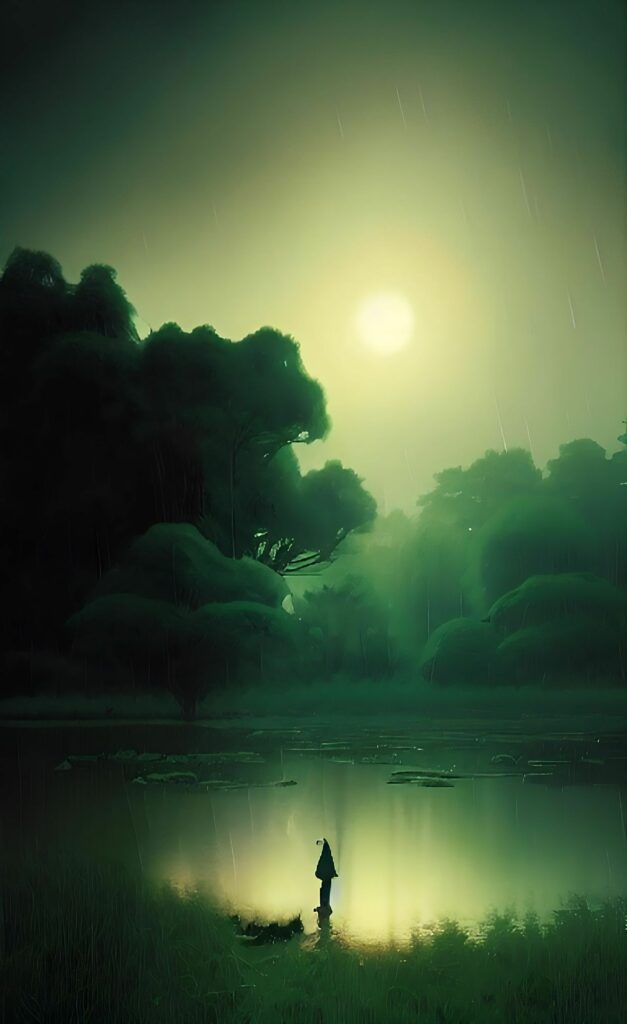
rain clouds descending –
singing louder near the pond,
a few old crickets
(from the book “Tides of Amber”, 2019)
© Marian C. Ghilea, 2019
artwork by Marian C. Ghilea, 2022
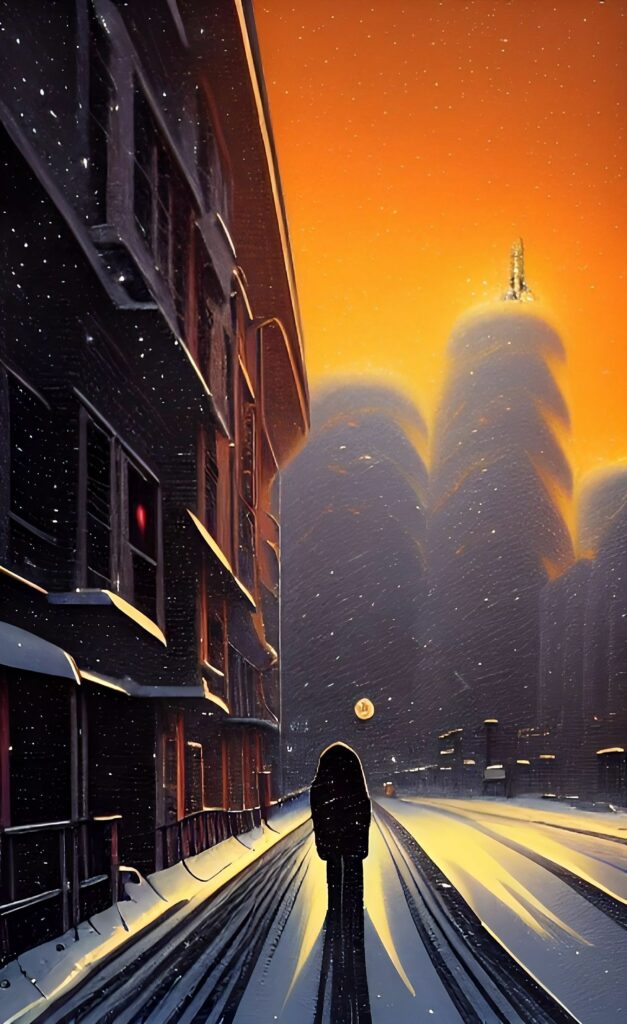
Nightfall.
Wind and snow.
I’m freezing
on empty streets.
Wounded,
my thoughts scatter,
turning corners,
shards of ice and glass,
memories
fading
into nothingness.
Moonlight.
I’m breathing
a city full of ghosts,
crumbling songs
already vanished,
already long gone.
A final deep breath.
Soon,
I shall sleep,
I shall turn into
a ghost full of cities.
(c) Marian © Marian C. Ghilea, 2019
artwork by Marian C. Ghilea, 2022